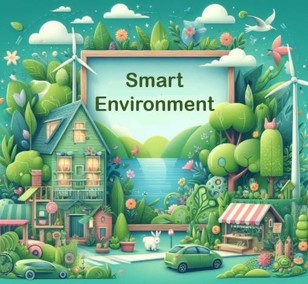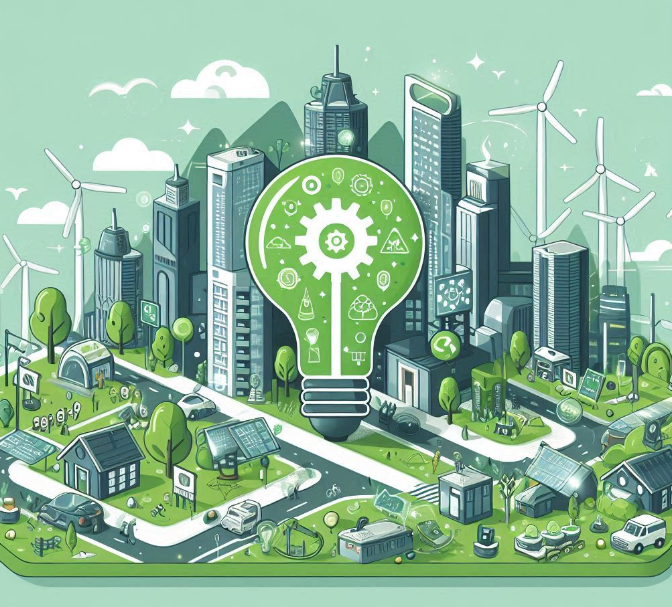Resources-> Blogs ->SmartEnvironment



Smart Environment Monitoring leverages IoT (Internet of Things) technology to transform how we perceive and manage our surroundings by enabling real-time data collection, analysis, and interpretation. IoT-enabled sensors deployed in diverse environments continuously gather data on parameters like air quality, temperature, humidity, noise, and water quality. This data is processed in centralized or cloud-based systems, aiding governments, environmental agencies, industries, and researchers in making informed decisions, optimizing resource allocation, reducing environmental risks, and enhancing overall quality of life. The integration of AI and ML enhances these systems with predictive analytics, anomaly detection, and adaptive responses, promoting early threat detection and efficient resource management. Smart environment monitoring offers multiple benefits, including improved public health, disaster prevention, pollution control, energy efficiency, cost savings, and operational efficiency, thereby supporting sustainable development goals and fostering a more accountable and responsive approach to environmental management.
Benefits of Smart Environment Monitoring
Smart environment monitoring uses advanced IoT (Internet of Things) technology to collect, analyse, and act on data from a variety of environmental indicators. This current method provides several benefits across multiple sectors:

Smart sensors and gadgets continuously collect information about air quality, temperature, humidity, noise levels, and other environmental conditions. This real-time data enables fast analysis and response.
Enhanced Accuracy:IoT sensors and cameras integrated into traffic infrastructure enable real-time monitoring of road conditions. This data is used for dynamic traffic management, ptimizing traffic signal timings, identifying congestion, and rerouting vehicles to alleviate traffic bottlenecks.
Air Quality Monitoring:Continuous monitoring of pollutants and allergens aids in the identification of dangerous circumstances, allowing for timely warnings and interventions to protect public health.
Disaster Prevention and Response:Environmental sensors can identify natural disasters such as floods, wildfires, and earthquakes early, allowing for rapid response mechanisms to reduce potential damage and save lives.
Pollution Control:Identifying pollution sources and monitoring their influence over time helps to implement successful pollution control techniques and regulations.
Smart Grid Integration:Environmental data informs smart grid systems, which optimise energy distribution based on real-time demand and environmental conditions, resulting in less energy waste.
Building Automation:Data on indoor and outside environmental conditions enables automated adjustments to heating, ventilation, and air conditioning (HVAC) systems, which improves building energy efficiency.
Cost savings:Preventive interventions and prompt responses to environmental changes can considerably lower the costs of environmental damage, healthcare, and energy usage.
Operational Efficiency:Businesses and industries can use environmental data to optimise their operations, increasing productivity and lowering costs.
Enhanced Accountability:Transparent data collection and reporting allow corporations and governments to be held accountable for their environmental impact, encouraging more responsible behaviour. impact and improve overall urban air quality.
The Smart Environment Monitoring sector is quickly evolving, owing to improvements in Internet of Things (IoT) technology. IoT sensors and devices are critical for gathering real-time data on a variety of environmental characteristics, including air quality, water quality, temperature, humidity, and noise levels. This data is then sent to centralised systems and analysed to generate actionable insights. The combination of IoT, artificial intelligence (AI), and big data analytics improves the ability to detect environmental changes and respond to potential threats efficiently.
Ajeevi Technologies provides innovative and customized solutions in the areas of smart cities, internet of things (IoT), and sustainable development which include:
IoT-enabled Solutions
Ajeevi Technologies has developed IoT-enabled solutions to improve the functioning of cities. Ajeevi offers a range of solutions like smart parking, smart street lighting, smart waste management, and smart water management systems that are connected to the internet and can be monitored and managed remotely.
Sustainable Energy Solutions
Ajeevi Technologies is focused on developing sustainable energy solutions for smart cities and provide solutions that are energy-efficient and rely on renewable energy sources such as solar and wind power.
Data Analytics
Ajeevi Technologies uses data analytics to gather and analyze data to provide insights into the functioning of the city. Ajeevi uses this information to optimize operations, improve service delivery, and make data-driven decisions.
Citizen Engagement
Ajeevi Technologies is committed to citizen engagement and involving citizens in the planning and implementation of smart city solutions. Ajeevi has developed platforms for citizen engagement, including mobile apps, web portals, and social media, which enable citizens to provide feedback, report issues, and participate in decision-making.
Overall, Ajeevi Technologies’ contributions to smart city solutions are aimed at making cities more sustainable, efficient, and citizen-friendly. Our innovative solutions, focus on sustainability and citizen engagement make them a valuable player in the smart city space. http://www.ajeevi.com


Android Handheld UHF Reader
Automatic Boom Barrier
Automatic Number Plate Reader Camera
Bin Level Sensor
Bio Metrics Machine
Bullet Camera Live
Chlorine Sensor
Data Transmission Unit
Emergency Call Box
Environment Sensor
Face Recognition
Flood Sensor
Fuel Sensor
Galvanized Iron Pole
Gi-Pole
GPS
GPS-AIS140
Handheld HF Reader
Handheld UHF Reader
PTZ Camera
Public Address Speaker
Public Address System
Hydraulic Boom Barrier
IP Bullet Camera
IRIS
Magnetic Sensor
Network Rack
Network Video Recorder
Panic Button
Parking Entry Exit UHF Reader Vehicle Mounted UHF Reader
Passenger information systems
Ph Sensor
Refrigerator Sensor
RFID Tag – HF
RFID Tag – UHF
RFID Tag Metal – UHF
Smart Kiosk
Smart Pole
Soil Sensor
Drainage Sensor
Temperature Sensor
Turbidity Sensor
Ultrasonic Flow Meter Variable Sign Board Weigh Bridge Entry Exit Reader
Thanks for ” Downloading”, “Discovering”, “AJEEVI Products”, hit the submit button requisite information will be in your email box shortly.
Ajeevi Offer “Enterprise IoT Solutions” with in-house R&D, Capability of manufacturing IOT devices.
505, Tower A-1, Corporate Park
Noida 201301, Uttar Pradesh India
presales@ajeevi.com
+91-9654323500